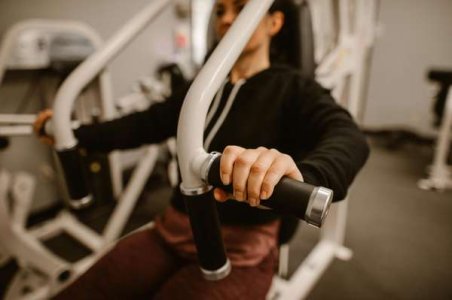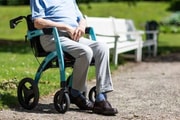This Woman's Workout Nightmare: How Exercise Turns Into a Life-Threatening Allergy!
By
Danielle F.
- Replies 3
For many of us, exercise is a crucial part of maintaining a healthy lifestyle, especially as we get older. It keeps our hearts strong, our muscles limber, and our minds clear. But imagine if lacing up your sneakers and going for a brisk walk could potentially be fatal. This is the reality for Maggie Habashy, a woman from Minnesota whose unusual condition turns physical activity into a life-threatening event.
Maggie's story is a stark reminder that the human body can sometimes react in ways that are as baffling as they are severe. About ten years ago, after the birth of her daughter, Maggie went for a run, her first in months, and was suddenly struck by an intense itchiness. Before long, her entire body was covered in hives—those angry red welts that signal the body's immune system is fighting what it perceives as a threat.
But for Maggie, the threat wasn't pollen or shellfish, common allergens for many. It was exercise itself. Her condition, known as exercise-induced anaphylaxis (EIA), is rare, affecting an estimated 0.05 percent of the population. For some, EIA is triggered by a combination of exercise and specific foods they've consumed beforehand. However, Maggie's case is particularly perplexing because her severe reactions have occurred even while fasting.
The symptoms of EIA are alarming: itchiness, hives, swelling in the throat, face, lips, hands, feet, and even genitals. Some sufferers also experience face reddening, shortness of breath, difficulty swallowing, chest pain, fainting, profuse sweating, headaches, and gastrointestinal issues like diarrhoea and nausea. For Maggie, these symptoms begin about 15 minutes into her workouts, escalating rapidly to the point where she can't talk, and her face swells up.
Despite undergoing a battery of allergy tests, doctors have been unable to pinpoint a specific food or allergen as the cause of Maggie's reactions. Dr Micah Karasov, her allergy specialist, noted that while most people with EIA have a food trigger, Maggie's condition is unique because she was fasting during some of her reactions.
The unpredictability of EIA means that Maggie now carries an EpiPen with her at all times, a necessary precaution should she experience anaphylaxis again. Her husband, Ali, has had to rush her to the hospital on more than one occasion, with doctors expressing concern over how quickly her condition deteriorates.
Maggie's experience with exercise is a roller coaster of emotions and physical limitations. Some days she can manage 15 minutes, other days 45, but the fear of a severe reaction always looms. It's a frustrating and emotional journey, one that has forced her to redefine her relationship with her body and her health.
For our readers at the Seniors Discount Club, Maggie's story is a reminder of the importance of listening to our bodies and being aware of how they react to different stimuli. If you experience unusual symptoms during or after exercise, it's crucial to consult with a healthcare professional. While EIA is rare, other conditions can also cause adverse reactions to physical activity, and early detection is key to managing any health issue.
Moreover, Maggie's condition highlights the need for understanding and empathy towards those with invisible illnesses or allergies. The next time someone jokes about being allergic to exercise, it's worth remembering that for some, like Maggie, it's no laughing matter—it's a daily challenge that requires courage, caution, and resilience.

We invite you to share your thoughts and experiences. Have you or someone you know dealt with unusual allergic reactions or health issues related to exercise? How have you adapted your fitness routine to accommodate your health needs? Your stories can be a source of support and inspiration for others facing similar challenges.
Maggie's story is a stark reminder that the human body can sometimes react in ways that are as baffling as they are severe. About ten years ago, after the birth of her daughter, Maggie went for a run, her first in months, and was suddenly struck by an intense itchiness. Before long, her entire body was covered in hives—those angry red welts that signal the body's immune system is fighting what it perceives as a threat.
But for Maggie, the threat wasn't pollen or shellfish, common allergens for many. It was exercise itself. Her condition, known as exercise-induced anaphylaxis (EIA), is rare, affecting an estimated 0.05 percent of the population. For some, EIA is triggered by a combination of exercise and specific foods they've consumed beforehand. However, Maggie's case is particularly perplexing because her severe reactions have occurred even while fasting.
The symptoms of EIA are alarming: itchiness, hives, swelling in the throat, face, lips, hands, feet, and even genitals. Some sufferers also experience face reddening, shortness of breath, difficulty swallowing, chest pain, fainting, profuse sweating, headaches, and gastrointestinal issues like diarrhoea and nausea. For Maggie, these symptoms begin about 15 minutes into her workouts, escalating rapidly to the point where she can't talk, and her face swells up.
Despite undergoing a battery of allergy tests, doctors have been unable to pinpoint a specific food or allergen as the cause of Maggie's reactions. Dr Micah Karasov, her allergy specialist, noted that while most people with EIA have a food trigger, Maggie's condition is unique because she was fasting during some of her reactions.
The unpredictability of EIA means that Maggie now carries an EpiPen with her at all times, a necessary precaution should she experience anaphylaxis again. Her husband, Ali, has had to rush her to the hospital on more than one occasion, with doctors expressing concern over how quickly her condition deteriorates.
Maggie's experience with exercise is a roller coaster of emotions and physical limitations. Some days she can manage 15 minutes, other days 45, but the fear of a severe reaction always looms. It's a frustrating and emotional journey, one that has forced her to redefine her relationship with her body and her health.
For our readers at the Seniors Discount Club, Maggie's story is a reminder of the importance of listening to our bodies and being aware of how they react to different stimuli. If you experience unusual symptoms during or after exercise, it's crucial to consult with a healthcare professional. While EIA is rare, other conditions can also cause adverse reactions to physical activity, and early detection is key to managing any health issue.
Moreover, Maggie's condition highlights the need for understanding and empathy towards those with invisible illnesses or allergies. The next time someone jokes about being allergic to exercise, it's worth remembering that for some, like Maggie, it's no laughing matter—it's a daily challenge that requires courage, caution, and resilience.
Key Takeaways
- Maggie Habashy, a woman from Minnesota, suffers from a rare allergy to exercise, which can lead to severe allergic reactions and life-threatening anaphylaxis.
- Symptoms experienced during exercise-induced anaphylaxis (EIA) include itchy hives, swelling in the throat, eyes, face, lips, hands, feet, and/or genitals, and in severe cases, difficulty breathing and fainting.
- Despite numerous allergy tests, no specific food or allergen has been identified as a cause for Maggie's reactions, which can commence around 15 minutes into a workout.
- Maggie now carries an EpiPen with her at all times in case she experiences anaphylaxis again and has to be cautious when engaging in physical activity.








